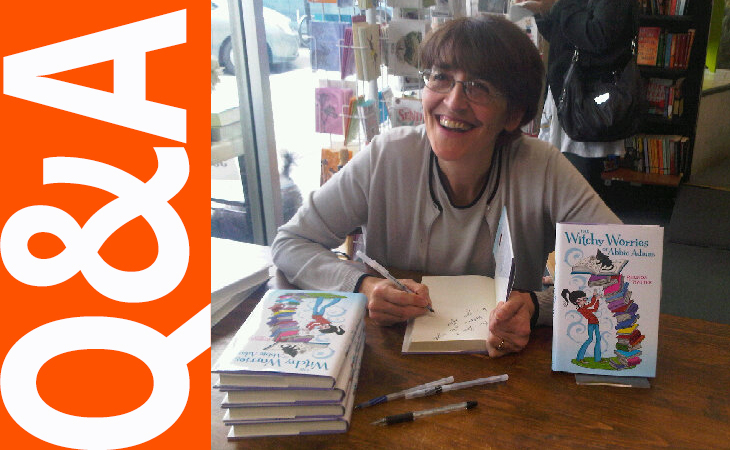Q: Your story The Witchy Worries of Abbie Adams revolves around Abbie Adams and her family who come from a long line of witches, and she’s having a tough time keeping it a secret from her best friend and the rest of her school. Especially the day her little brother morphs into a wolf and tries to eat his teacher. Can you tell us a little more about the story and some of its characters?
A: When my youngest boy, Ethan, was little, I’m proud to say that he was a charming, sweet, bright, funny boy whose behavior was excellent…uh…except when it wasn’t. He had, shall we say, a bit of a problem processing big feelings and he’d often melt down and tantrum…for a loooong time. In the middle of coping with one of these episodes, I rather sweetly turned to my husband and sighed, “It’s like he turns into a werewolf.” And that’s what gave me the idea for a little boy who really did turn into a werewolf when he got upset…and then I started to think about what it might be like for the big sister of a little boy like that…and from that idea, Abbie Adams and her whole magical family began to emerge.
Q: You have been an editor for some of Hollywood’s biggest names in TV and Film including Aaron Spelling and Lawrence Gordon, can you tell us what it was like to work with them?
A: What I did for them is actually called story analysis, and the only interaction I ever had with Aaron Spelling himself was being slightly horrified that he was smoking a pipe in the elevator when we rode up together. But I worked with Lawrence Gordon for a long time, and he’s known as one of the nicest producers in Hollywood. When I brought my kids in to show them where I worked, they left with arms piled up with Hellboy merchandise. He’s got loads of Southern charm and is very, very, very smart. What story has influenced your life?
Well, an awful lot of them. But if we’re looking for an early influence, I’d have to say it was Little Women. Jo wanted to be a writer and I knew that she was a version of Louisa May Alcott, who of course actually was a writer (and an awfully good one) so it was my first introduction to the idea that books might not only be for reading…they might be for writing as well.
Q: Do you have any advice to aspiring writers?
A: Rear end in the seat – fingers on keyboard…even if you have no idea what to write. I love what E.L. Doctorow said: “Writing is like driving at night in the fog. You can only see as far as your headlights, but you can make the whole trip that way.”
Q: What are the ingredients for a blockbuster story to you?
A: I have to be interested in the central characters…and I have to be made to wonder what could possibly happen next.
Q: What story do you enjoy reading over and over again?
A: The saddest day in my life was when I realized there was no more Jane Austen to read. So I had to read them all fifty times. I’m now giving them a ten or twenty-year hiatus…but I know I’ll read them again sometime.
Q: How would you increase literacy?
A: I’m a great proponent for author visits in schools. I visit a lot of elementary schools and when kids get to meet a writer and hear about an exciting story and how it came to life, even reluctant readers get interested.
Q: What’s on the horizon for Rhonda Hayter?
A: I’m happily editing at FriesenPress, where I love nurturing writers and helping them to improve their books. I also have a new book just setting out to make the rounds of publishers; another middle-grade. I’d tell you more about it but it’s hard to type with my fingers crossed.
Q: What ice cream flavor would you invent?
A: Why in the world would one need to invent an ice cream flavor when that kind with the little peanut butter cups in it exists in the world? It’s simple genius.
You can follow Rhonda here: http://rhondahayter.com










